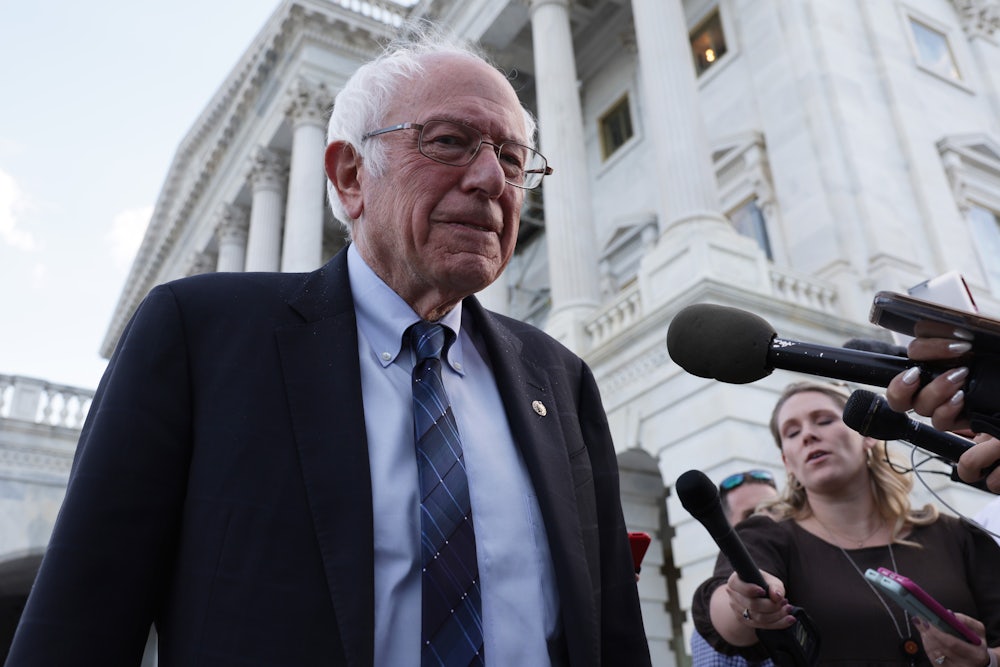“The world today faces enormous crises,” Senator Bernie Sanders began. I had asked the Vermont independent how he would characterize two years of the razor-thin 50-seat Democratic majority.
My question was broad. Sanders went even broader in his response, outlining the various emergencies facing the general public: climate change, the ongoing coronavirus pandemic, assaults on democracy, even the risk of nuclear war with the escalating threats from Russian President Vladimir Putin. “Other than that, everything is really, really good,” Sanders concluded sarcastically.
He pivoted then to the argument he is best known for, the struggle that he insists is overlooked by the corporate-owned media, what he sees as the taboo in national conversation nonetheless defining modern politics: the plight of the American worker. Ahead of critical midterm elections, Sanders says he will continue to prod the Democratic Party to connect with working-class voters—even as he believes the party may not be up to the task of defending their interests.
We spoke in his office on the day before senators left Washington for a month, not scheduled to return until mid-November. So when I asked about the two years in the majority, it was characteristic for Sanders to respond on the macro scale, stretching his theory of structural problems in American society over the framework of congressional politics.
He outlined the compounding crises that affect people on an individual level: rising inflation; stagnant wages; prohibitive costs for childcare, health care, education, housing; younger generations economically worse off than their parents. People crave a reason for their struggles, he contended, and so turn to figures like Donald Trump for answers.
“They need an explanation, in my view, as to why they are worse off, and Trump is giving them—and his friends give them—the lying, dishonest explanations. ‘It’s the immigrants, it’s blacks, it’s gays, it’s transgender people,’” Sanders said. But the “real cause” of that pain is the “economic system designed to benefit the very, very rich at the expense of everybody else.”
“You with me? You following me?” Yes, I’m following.
Democrats have lost the white working class, Sanders continued, and he pointed to some reporting that they are in the process of slowly losing even the Latino and Black working class, long considered pillars of the party. The nation’s wealth is concentrated in the hands of few people, while the bottom portion of the income bracket lives paycheck to paycheck.
“We need to make radical changes in the economy, to protect the needs of working people. So, you know, to me, that’s what’s been going on,” Sanders finished. “And the problem of the Democratic Party is, you know, for a variety of reasons, it is not addressing those issues effectively.”
These are not unfamiliar arguments for anyone who’s been paying attention to politics for the past six years. Sanders catapulted to the national scene in the 2016 Democratic primary by highlighting these issues, reiterating them in the 2020 election and, more recently, during the fight to pass the ill-fated Build Back Better Act. He raised them again in his one-man crusade to add amendments to the Inflation Reduction Act, efforts stymied not only by Republicans but by most members of his own caucus.
When I spoke to Sanders in late September, it was a critical midway point for the Democratic caucus in the Senate: a month and change since the passage of the Inflation Reduction Act, which Sanders had ultimately reluctantly supported, and a handful of weeks before the election. Although the IRA was the most significant climate legislation in congressional history and included provisions like allowing Medicare to negotiate some drug prices, many progressive priorities had dropped out of the bill. Most progressives had opted to grin and bear it, taking the victory of a significant—albeit far smaller than originally hoped—investment. Sanders, however, had not taken the route of settling without complaint.
When I asked why he chose to propose multiple amendments to the bill, even as other Democrats had vowed to vote down any amendment that compromised the underlying bill, Sanders argued that he had shown the American people what wasn’t in the bill.
“This is when many Democrats disagree with me. They can go out and tell the American people all the great things that they do. Well, you can argue how significant any of these things are, but do you think the average American says, ‘Oh, my God, my life is so much better, I can’t believe it, because of the [IRA]?” Sanders said. “Can you really sell something that, in four years, we’re going to negotiate 10 drugs that will benefit Medicare, not you as a consumer. You think people are gonna say, ‘Wow, really good’?”
In a sense, Sanders is always in the minority; he is one of two independents who caucus with Democrats, the other being Senator Angus King of neighboring Maine. This distinction has been snidely noted by opponents in his two previous presidential bids, in 2016 and 2020: Why seek the Democratic nomination if he is unwilling to bear the party’s mantle? When I asked if there’s any dissonance in critiquing the Democratic Party when he himself is an independent, Sanders acknowledged, “Yeah, there is.”
But even if he’s occasionally in the minority of his caucus, Sanders always argues that the majority of the American people are with him—he pointed to polling that showed the popularity of individual items in the Build Back Better Act. (However, although several pieces of the Build Back Better Act were supported by a majority of voters, some polling showed that the bill as a whole was less popular than its components.) If members of Congress don’t recognize the need to remedy economic inequity, his argument goes, that means they are out of touch, not the other way around.
“Somebody once said—I thought that they were joking, but I really think it’s kind of true now—the last to know what’s going on in the world is people who live on Capitol Hill. The last people,” Sanders said, rapping his knuckles on the table for emphasis. “Half the people in this country today live paycheck to paycheck. Do you see that reflected in the politics of what goes on here on a daily basis?”
If one accepts the premise that Democrats have not done enough to ameliorate the struggles of working Americans, then how do they ask voters for another turn in the majority? Congress has accomplished all that it can before the election; what, then, should be the pitch, if one sees the failures as equal to the successes?
Characteristically, Sanders takes a step back when offering his answer. He credited Biden for championing and congressional Democrats for passing the American Rescue Plan, the $1.9 trillion measure intended to offer relief to the most vulnerable citizens, with provisions such as a temporarily expanded child tax credit, increased nutrition benefits for low-income Americans, and rental assistance. He also noted that Biden’s approval ratings were at their highest point in March 2021, the same month that he signed the bill.
“What was always part of that equation was, we would come back with another piece of legislation to deal with the long-term systemic problems facing America, not just the emergency problems,” Sanders said. That other piece of legislation was the Build Back Better Act, which among (many) other things, would have extended the expanded child tax credit, offered universal prekindergarten and paid family leave, and expanded Medicare to cover hearing, dental, and vision. But the Build Back Better Act, which passed in the House, died in the Senate due to opposition from Senator Joe Manchin.
“That was transformational. And we came within two votes of doing that. And I think that the Democratic Party will forever regret not having those two votes,” Sanders said, referring to Manchin and Senator Kyrsten Sinema, who had also expressed skepticism about some portions of the bill. “But you asked me, ‘What do you say to people?’ This is what you say to people: Give us two or three more senators, and give us control of the House. And in fact, we will begin addressing all of those issues.” If Democrats had passed the Build Back Better Act, Sanders contended, “there would be no question as we go into this midterm that both the House and the Senate would be securely Democrat.” (Hindsight is, of course, 20/20—or rather, 2022.)
This is the message that many progressive Democrats are promoting: Elect even more Democrats, and we’ll get it done this time, for real. But the elephant in the room is the likelihood that Democrats lose the House—as is widely expected—in which case, Congress won’t be able to accomplish any major priorities. Sanders, who will be hitting the campaign trail ahead of the election, does not cast himself as a prognosticator. He acknowledged to me that “I don’t have any better guess than anybody else has whether Democrats retain control of the Senate” and that keeping the House would be “more difficult, but long-shot possible.”
The octogenarian is generally popular with younger Americans, perhaps in part because he is infinitely memeable. But while he did well with young voters in the 2016 elections, fewer voters in that demographic turned out in 2020—in several primaries, Biden drew a larger margin of support from older voters than Sanders did among younger voters. If voters in their twenties and thirties were less enthusiastic about a presidential election, Democrats may especially struggle to motivate them in a midterm election after, by Sanders’s accounting, being disappointed by Congress.
“What I do know is that the larger the voter turnout, especially among younger people, the better it will be for Democrats. And I am concerned that, among working people and younger people, there is not the kind of energy and enthusiasm that I think we need to do well in November,” Sanders said. “So I will do my best to try to speak to workers and make the case as to why voting for Republicans is counterproductive, and to get young people involved in the political process as well.”
If Democrats do manage to beat expectations and hold onto both chambers of Congress, Sanders does have expectations for the next term. He anticipated another vote on changing the filibuster, and circling back to voting rights—efforts that previously failed by two votes, cast by Manchin and Sinema, earlier this year.
“That, plus a very strong reconciliation bill which can take us back to revised Build Back Better, but a very significant piece of legislation that addresses the long-term systemic problems facing the country,” Sanders predicted.
But if those systemic problems are not addressed, Sanders argued, the situation will only worsen for working Americans—and for Democrats. “It ties into the politics, because if you don’t address it, people are saying, ‘What is this government doing for me?’ That’s what Trump benefits from,” he said. “Either show the government can work for ordinary people and address those problems, [like] raising the minimum wage. If not, people lose faith in government, and you move toward fascism.”
Any reporter who has interviewed Sanders in the halls of the Capitol knows the typical way he operates: If he has time, and enough journalists have crowded around him, he will pause in his walk from the Senate basement to the chamber for votes. He will make the case that he wants to make, perhaps answer a few questions, and will move on once he has said his piece.
To conduct a longer interview with Sanders is to hear his arguments in fuller detail. His platform still has difficulty garnering universal support from Democrats in Congress—with the exception of those times when emergency measures are deemed necessary, as occurred during the pandemic. Still, ideas that were considered radical only a few short years ago are now at least somewhat familiar.
Sanders’s arguments are not new, either to him or to the modern progressive movement that he helped to cultivate in Congress and on the ground. But he sees value in repeating them, in insisting that his colleagues in the Capitol listen, an exercise in persistence or stubbornness—or futility—depending on your point of view. And while he will talk for a long time, he won’t talk forever. When he’s done, you’ll know it.
“Alright, what else do you need?” Sanders asked me, blunt but not begrudging, toward the end of our discussion. “I’ve given you enough for a book here, you know.”










